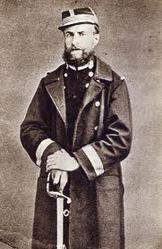
When he was in Paris, he dedicated his time to the ‘red republicanism’ cause, and began composing articles for the weekly newspaper, ‘La Marseillaise’. Eventually, because of his failure to stage a revolt on 7 February 1870 at Belleville, Flourens was forced to run away from France. On Napoleon’s downfall, he returned to Paris after a short been living in Italy and placed himself as the head of a group of 500 tirailleurs, or sharpshooters. Due to his revolutionary ways, being one of the instigators of the 31 October 1870 uprising against the moderate policy of the provisional government, he was imprisoned at Créteil, nearby Vincennes, ordered by the provisional government, and detained on 7 December 1870 at Mazas, but was discharged by his team on the evening of 21 to 22 January. He joined the uprising of the population on 18 March, was appointed by the XXe arrondissement to be a member of the revolutionary Commune, and was chosen to be general. Gustave Flourens was among the most functional insurrection leaders, and after a raid against the troops of Versailles on 3 April, he escaped into an inn close to the bridge that divides Chatou and Rueil. After he was seized in that area and was neutralised by the Gendarmerie, Captain Jean-Marc Démaret murdered him. Apart from his 1869 Science de l'homme, Flourens also authored several fugitive pamphlets.
 RSS Feed
RSS Feed